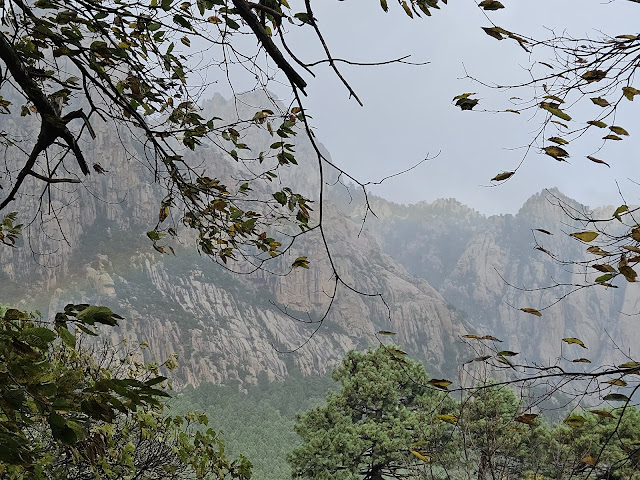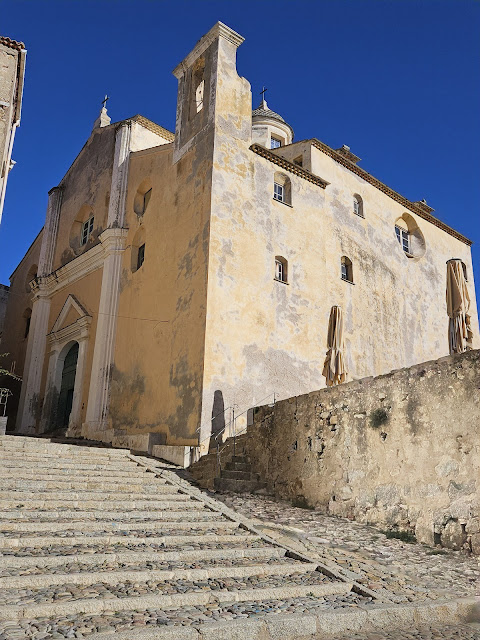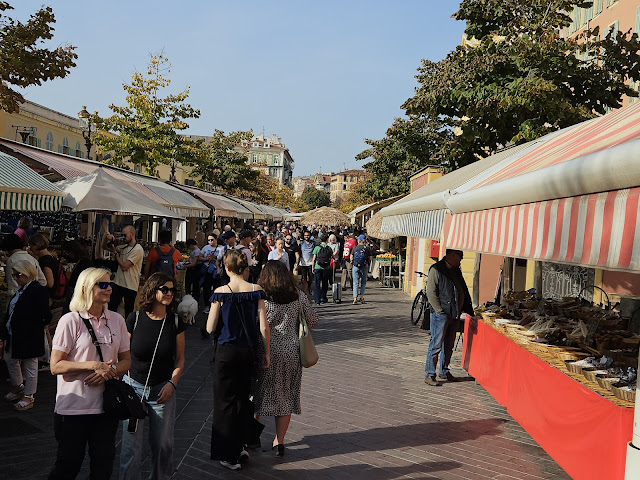For our final time in Corsica we found a lovely villa in a remote area south of Porto Vecchio in the Santa Giulia area, which made it handy to also visit Bonifacio at the southern tip. We picked a spot closer to PV because it was a larger town (12K vs. 4K) since we have found more and more places shutting down as December dawns. In retrospect it might have been better to visit Corsica back in October and the Riviera in November. While it would have been a cooler November switch, the Riviera is busy all year long so more options would have been available to us. In any event we lucked out with a last minute nice, cozy villa and we adjusted with shorter day trips.
Our first visit was to Porto Vecchio which has a hilltop Citadel overlooking the harbour area. While easy to stroll around it was a little quiet up top so we descended to the port and walked along the promenade which was a little busier. The next day we drove to Bonifacio for a visit. Their massive Citadel perched at the top of a limestone cliff had a 100 metre drop into the sea. Monks had carved a stone staircase into the cliff, so a steep 189 step path was an alternative to the 100 metre dive if the fort was attacked from the mainland. While looking for a place to park, our chariot suffered a wheel fender scratch trying to navigate a narrow old town street. The cobblestone, downhill, small step (5 cm drop every 2 metres) with a narrow curve near the bottom did not seem like a reasonable choice. Then, the resulting 15 point turn didn't go according to plan. I blame that on the town planners from the middle ages who had no concept that cars might rule the road someday. We'll soon see who the car rental company thinks is responsible. After that episode we grabbed a spot on the outskirt of the Citadel and made the wiser decision to walk through the old town maze of streets and later settling for a meal back down by the port.
On a very windy day (50-60 km/hr) we decided on a road trip into the mountains to minimize any walkabouts. While we managed to see some wonderful sights (the Col de Bavella spiked rock mountaintop and L'Ospedale reservoir), the torrential wind brought down branches and some trees covering the road surface, and eventually we ran into a road closure due to the damage resulting in a return trip rather than the loop planned. Another day we drove over to nearby Palombaggia Beach, the top rated beach in Corsica. On a quiet day we walked along the white sand beach that stretched for almost 2 km's. It had a massive parking lot for the large summer crowds and a several hot weather beachfront bars to cater to their needs (all closed). Another day we did a coast-to-coast drive, heading inland to the large mountain town of Levie, then on to Sartene (piracy history), and finally to the west coast port town of Propriano where we had a late lunch by the harbourfront. We drove back along the southern coast on a blue sky day with the Italian island of Sardinia clearly visible. We saw Sardinia a second time on a day where we drove out to Cape Pertusato, east of Bonifacio. where we had excellent views of the lighthouse and the white limestone cliffs supporting Bonifacio.
As like many of our adventures we ended our French trip with a visit to Basel to see our Swiss daughter and her partner. Beyond the nice way to finish a long trip with them by our side, they always have interesting outings planned for our stay. This time it was not only to the enjoyable European Christmas markets, where participants wander amongst the multitude of stalls with a refillable cup of hot mulled wine in their hand, but also to an outdoor Illumination show in Zurich. It was accompanied with a fondue dinner beforehand.
 |
| On our drive back from Propriano on the west coast we took the southern coastal route and found a picturesque spot with the Italian island of Sardinia in the background. |
 |
| While on our Basel walk to the Christmas Market we came across this well decorated building. |
 |
| The entry point for the outdoor Illumination show in Zurich. They had an animated show for the children first, followed by an Odyssey in Space show which included some hit tunes. |
 |
| The large Christmas Market in Zurich with the Opera House in the background. |






















































